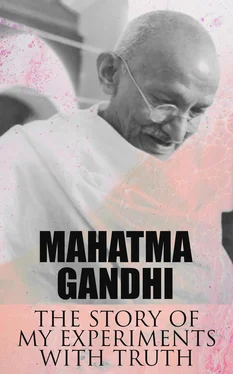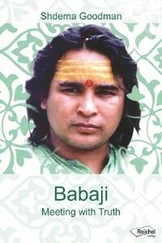One day the friend began to read to me Bentham’s Theory of Utility. I was at my wits’ end. The language was too difficult for me to understand. He began to expound it. I said: ‘Pray excuse me. These abstruse things are beyond me. I admit it is necessary to eat meat. But I cannot break my vow. I cannot argue about it. I am sure I cannot meet you in argument. But please give me up as foolish or obstinate. I appreciate your love for me and I know you to be my well-wisher. I also know that you are telling me again and again about this because you feel for me. But I am helpless. A vow is a vow. It cannot be broken.’
The friend looked at me in surprise. He closed the book and said: ‘All right. I will not argue any more.’ I was glad. He never discussed the subject again. But he did not cease to worry about me. He smoked and drank, but he never asked me to do so. In fact he asked me to remain away from both. His one anxiety was lest I should become very weak without meat, and thus be unable to feel at home in England.
That is how I served my apprenticeship for a month. The friend’s house was in Richmond, and it was not possible to go to London more than once or twice a week. Dr. Mehta and Sjt. Dalpatram Shukla therefore decided that I should be put with some family. Sjt. Shukla hit upon an Anglo-Indian’s house in West Kensington and placed me there. The landlady was a widow. I told her about my vow. The old lady promised to look after me properly, and I took up my residence in her house. Here too I practically had to starve. I had sent for sweets and other eatables from home, but nothing had yet come. Everything was insipid. Every day the old lady asked me whether I liked the food, but what could she do? I was still as shy as ever and dared not ask for more than was put before me. She had two daughters. They insisted on serving me with an extra slice or two of bread. But little did they know that nothing less than a loaf would have filled me.
But I had found my feet now. I had not yet started upon my regular studies. I had just begun reading newspapers, thanks to Sjt. Shukla. In India I had never read a newspaper. But here I succeeded in cultivating a liking for them by regular reading. I always glanced over The Daily News, The Daily Telegraph, and The Pall Mall Gazette. This took me hardly an hour. I therefore began to wander about. I launched out in search of a vegetarian restaurant. The landlady had told me that there were such places in the city. I would trot ten or twelve miles each day, go into a cheap restaurant and eat my fill of bread, but would never be satisfied. During these wanderings I once hit on a vegetarian restaurant in Farringdon Street. The sight of it filled me with the same joy that a child feels on getting a thing after its own heart. Before I entered I noticed books for sale exhibited under a glass window near the door. I saw among them Salt’s Plea for Vegetarianism. This I purchased for a shilling and went straight to the dining room. This was my first hearty meal since my arrival in England. God had come to my aid.
I read Salt’s book from cover to cover and was very much impressed by it. From the date of reading this book, I may claim to have become a vegetarian by choice. I blessed the day on which I had taken the vow before my mother. I had all along abstained from meat in the interests of truth and of the vow I had taken, but had wished at the same time that every Indian should be a meat-eater, and had looked forward to being one myself freely and openly some day, and to enlisting others in the cause. The choice was now made in favour of vegetarianism, the spread of which henceforward became my mission.
XV PLAYING THE ENGLISH GENTLEMAN
Table of Contents
My faith in vegetarianism grew on me from day to day. Salt’s book whetted my appetite for dietetic studies. I went in for all books available on vegetarianism and read them. One of these, William Howard’s The Ethics of Diet, was a ‘biographical history of the literature of humane dietetics from the earliest period to the present day.’ It tried to make out, that all philosophers and prophets from Pythagoras and Jesus down to those of the present age were vegetarians. Dr. Anna Kingsford’s The Perfect Way in Diet was also an attractive book. Dr. Allinson’s writings on health and hygiene were likewise very helpful. He advocated a curative system based on regulation of the dietary of patients. Himself a vegetarian, he prescribed for his patients also a strictly vegetarian diet. The result of reading all this literature was that dietetic experiments came to take an important place in my life. Health was the principal consideration of these experiments to begin with. But later on religion became the supreme motive.
Meanwhile my friend had not ceased to worry about me. His love for me led him to think that, if I persisted in my objections to meat-eating, I should not only develop a weak constitution, but should remain a duffer, because I should never feel at home in English society. When he came to know that I had begun to interest myself in books on vegetarianism, he was afraid lest these studies should muddle my head; that I should fritter my life away in experiments, forgetting my own work, and become a crank. He therefore made one last effort to reform me. He one day invited me to go to the theatre. Before the play we were to dine together at the Holborn Restaurant, to me a palatial place and the first big restaurant I had been to since leaving the Victoria Hotel. The stay at that hotel had scarcely been a helpful experience, for I had not lived there with my wits about me. The friend had planned to take me to this restaurant evidently imagining that modesty would forbid any questions. And it was a very big company of diners in the midst of which my friend and I sat sharing a table between us. The first course was soup. I wondered what it might be made of, but durst not ask the friend about it. I therefore summoned the waiter. My friend saw the movement and sternly asked across the table what was the matter. With considerable hesitation I told him that I wanted to inquire if the soup was a vegetable soup. ‘You are too clumsy for decent society,’ he passionately exclaimed. ‘If you cannot behave yourself, you had better go. Feed in some other restaurant and await me outside.’ This delighted me. Out I went. There was a vegetarian restaurant close by, but it was closed. So I went without food that night. I accompanied my friend to the theatre, but he never said a word about the scene I had created. On my part of course there was nothing to say.
That was the last friendly tussle we had. It did not affect our relations in the least. I could see and appreciate the love by which all my friend’s efforts were actuated, and my respect for him was all the greater on account of our differences in thought and action.
But I decided that I should put him at ease, that I should assure him that I would be clumsy no more, but try to become polished and make up for my vegetarianism by cultivating other accomplishments which fitted one for polite society. And for this purpose I undertook the all too impossible task of becoming an English gentleman.
The clothes after the Bombay cut that I was wearing were, I thought, unsuitable for English society, and I got new ones at the Army and Navy Stores. I also went in for a chimney-pot hat costing nineteen shillings—an excessive price in those days. Not content with this, I wasted ten pounds on an evening suit made in Bond Street, the centre of fashionable life in London; and got my good and noble-hearted brother to send me a double watch-chain of gold. It was not correct to wear a ready-made tie and I learnt the art of tying one for myself. While in India, the mirror had been a luxury permitted on the days when the family barber gave me a shave. Here I wasted ten minutes every day before a huge mirror, watching myself arranging my tie and parting my hair in the correct fashion. My hair was by no means soft, and every day it meant a regular struggle with the brush to keep it in position. Each time the hat was put on and off, the hand would automatically move towards the head to adjust the hair, not to mention the other civilized habit of the hand every now and then operating for the same purpose when sitting in polished society.
Читать дальше












